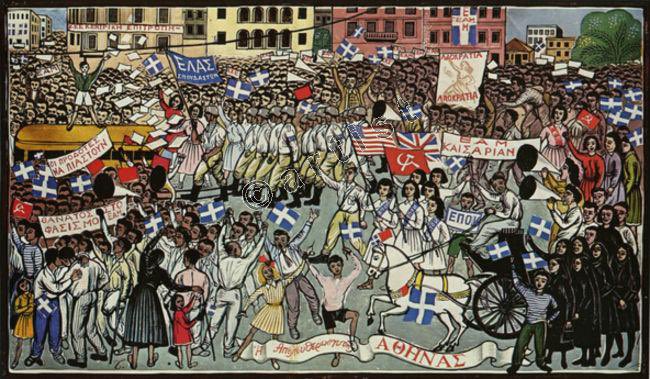

“This is not just a symbolic occasion,” declared a speaker representing the Open City movement, emphasizing the significance of the anniversary. Eighty years ago, the people of Athens, led by the National Liberation Front (EAM), drove out their Nazi oppressors, leaving behind a legacy of resistance against tyranny. This legacy, the speaker urged, must inspire contemporary struggles against growing threats.
The Open City movement used the anniversary to renew their call for an Antifascist Struggle Museum in Athens, to be named after Manolis Glezos and Lakis Santas, heroes of the resistance. “Preserving historical memory is a duty we owe ourselves and future generations, especially in these times of social and political upheaval,” the spokesperson said. The group also demanded that Greece officially recognize liberation day as a day of remembrance against fascism, mirroring similar commemorations in other countries.
The anniversary comes amidst growing global unrest. The ongoing conflict in the Middle East, marked by horrific violence and the threat of genocide, serves as a stark reminder of the human cost of unchecked hatred.
Meanwhile, the rise of the far-right in Europe, with its extremist views infiltrating even mainstream conservative parties, has set off alarm bells across the continent. Within Greece, groups masking themselves as anti-establishment movements but espousing far-right ideologies are vying for political power.
“We remember the devastation wrought by fascists and Nazis in Athens and throughout Greece, during the occupation, the junta, and the dark days of Golden Dawn’s rise,” the statement continued.
As Athens commemorates its liberation, the message echoes: Never again war, never again fascism. The fight continues against forgetting the past and revising history to suit dangerous agendas.
Greece annually commemorates October 28, 1940, when its strongman leader Ioannis Metaxas refused Italian fascist leader Benito Mussolini’s ultimatum to surrender or face invasion.
Yet scant attention is paid to October 12, 1944, when Greece’s foremost resistance group ELAS marched through Syntagma Square in central Athens to the applause of hundreds of thousands of people.
That historic moment marking Greece’s freedom from the Nazi yoke was soon overshadowed by violence and clashes between the communist ELAS and British-backed royalist government for control of the country.
The ensuing 1946-1949 civil war saw the communists defeated and led to decades of political turmoil.
“The civil war in Greece, as in Spain, deeply traumatised society, making it impossible to deal with certain events of the past and move forward as a society,” said historian Tasoula Vervenioti.
“If we don’t deal with our past, we run the risk of losing our places of remembrance,” she warned.
This year, the Athens city council urged the public to take part in a series of conferences and exhibitions to “honour those who fought for democracy and freedom”.
“We are keeping memories alive so that younger people can learn and determine their future with strength and vigour,” the city’s socialist Mayor Haris Doukas said in a statement.
Greek Prime Minister Kyriakos Mitsotakis will visit Kozani on Thursday, April 3, to promote development…
Greece braces for another day of unsettled weather on Thursday, as rain and thunderstorms sweep…
A desperate struggle unfolded off the northern coast of Lesbos as a boat carrying migrants…
PAOK Thessaloniki secured a dramatic 90-88 overtime victory against Cholet Basket, earning a spot in…
Maria Sakkari hit back at criticism over her drop outside the top 80 WTA rankings…
Riyadh – April 2, 2025—Saudi Arabia’s national airline, Saudia, announced in a press release that…